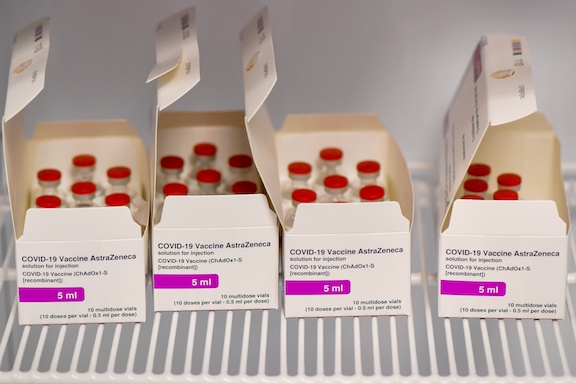EU wants vaccine exports notified after Astra sparks anger
European Union regulators proposed requiring drugmakers to flag exports of coronavirus vaccines in advance as the bloc seeks to step up inoculations amid growing anger about delivery delays by suppliers including AstraZeneca Plc.
The European Commission initiative on Monday coincided with recommendations for stricter curbs on travel to the 27-nation EU. The commission recommended that even people visiting the bloc for essential reasons be required to show a negative Covid-19 test taken within 72 hours of departure.
The commission’s proposed “transparency mechanism” for vaccine exports comes three days after it expressed “deep dissatisfaction” with a disclosure by AstraZeneca that planned deliveries of its Covid-19 vaccine would face delays.
“We want clarity on transactions and full transparency concerning the export of vaccines from the EU,” European Health Commissioner Stella Kyriakides told reporters on Monday in Brussels. “All companies producing vaccines against Covid-19 in the EU will have to provide early notification whenever they want to export vaccines to third countries.”

The proposals, due to be discussed by EU governments, come amid political alarm about hurdles to the rollout of coronavirus vaccines by drugmakers that also include Pfizer Inc. and Moderna Inc. The EU lags behind the U.S. and the U.K. in terms of doses administered as a share of its population.
“We could deliver many more vaccines, we just don’t have access to them,” Greek Prime Minister Kyriakos Mitsotakis said at a virtual panel of the World Economic Forum on Monday.
Croatian Premier Andrej Plenkovic told reporters in Zagreb that “vaccine diplomacy has turned into vaccine hijacking” as countries that aren’t tied to collective purchase agreements are willing to pay more for early access.
In mid-January, Pfizer reported a production disruption at a factory in Belgium that reduced vaccine deliveries to member countries last week. And last Friday, AstraZeneca—which may get EU approval for its shot later this week—announced delays during the first quarter to previously scheduled deliveries to the continent.
Commission President Ursula von der Leyen spoke earlier on Monday by phone with AstraZeneca Chief Executive Officer Pascal Soriot.
“She made it clear that she expects AstraZeneca to deliver on the contractual arrangements,” spokesman Eric Mamer told reporters. The commission last year signed an advance purchase agreement with the company for as many as 400 million doses—part of a total 2.3 billion doses secured so far for the EU.
A representative for the company said Soriot was pleased to speak to Von der Leyen and “stressed the importance of working in partnership and how AstraZeneca is doing everything it can to bring its vaccine to millions of Europeans as soon as possible.”
Kyriakides said that Astra failed at an EU meeting on Monday to provide adequate answers to questions about the new, slower delivery schedule and that another exchange with the company had been scheduled for this evening.
“This new schedule is not acceptable,” she said. “The European Union wants to know exactly which doses have been produced where by AstraZeneca so far and if or to whom they have been delivered.”
She added: “We want our contract to be fully fulfilled.”
Travel Restrictions
Countries across the EU have prolonged recession-inducing lockdowns to tame the spread of the virus, which has killed more than 400,00 people in the bloc since last spring. The commission said on Monday that interventions such as stay-at-home measures and the temporary closing of certain businesses must be maintained and in some cases reinforced, while all non-essential travel must stop.
For arrivals from countries where a worrying mutation of the virus has been detected, the commission said member states should systematically set obligations such as self-isolation, quarantine and contact tracing for as many as 14 days. In addition, it said people arriving from outside the EU should submit a passenger-locator form.
The EU already discourages non-essential visits by residents of all other countries except eight—a list that was created last year and that gets reviewed about every two weeks.
Similar Stories

December 2024 U.S. Transportation Sector Unemployment (4.3%) Was the Same As the December 2023 Level (4.3%) And Above the Pre-Pandemic December 2019 Level (2.8%)
View ArticleDP World appoints Jason Haith as Vice President of Freight Forwarding for U.S. and Mexico
DP World, a global leader in logistics and supply chain solutions, has announced the appointment of Jason Haith as Vice President, Commercial Freight Forwarding – U.S. and Mexico, effective immediately.…
View Article
Amaero secures final approval for $23.5M loan from Export-Import Bank
View ArticleU.S. Bureau of Labor Statistics employment situation
Total nonfarm payroll employment increased by 256,000 in December, and the unemployment rate changed little at 4.1 percent, the U.S. Bureau of Labor Statistics reported today. Employment trended up in…
View ArticleImport Cargo to remain elevated in January
A potential strike at East Coast and Gulf Coast ports has been avoided with the announcement of a tentative labor agreement, but the nation’s major container ports have already seen…
View ArticleS&P Global: 2025 U.S. transportation infrastructure sector should see generally steady demand and growth
S&P Global Ratings today said it expects activity in the U.S. transportation sector will continue to normalize in 2025, with growth rates for most modes of transportation slowing to levels…
View ArticleGet the most up-to-date trending news!
SubscribeIndustry updates and weekly newsletter direct to your inbox!





